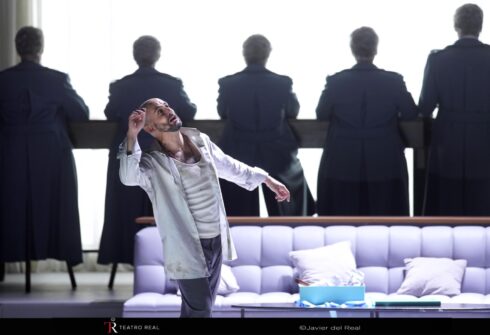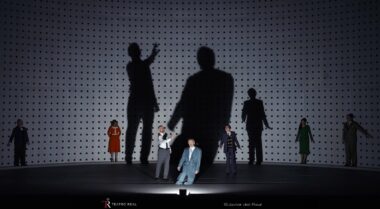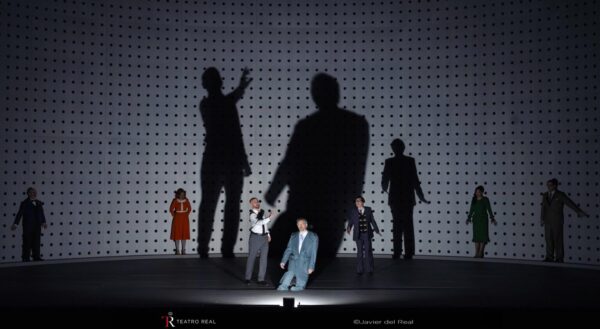 Spain Mozart, Mitridate, re di Ponto: Soloists, Teatro Real Orchestra / Ivor Bolton (conductor). Teatro Real, Madrid, 23.3.2025. (JMI)
Spain Mozart, Mitridate, re di Ponto: Soloists, Teatro Real Orchestra / Ivor Bolton (conductor). Teatro Real, Madrid, 23.3.2025. (JMI)

Production:
Director – Claus Guth
Sets – Christian Schmidt
Costumes – Ursula Kudrna
Lighting – Olaf Winter
Dramaturgy – Konrad Kuhn
Choreography – Sommer Ulrichson
Cast:
Mitridate – Juan Francisco Gatell
Aspasia – Sara Blanch
Sifare – Elsa Dreisig
Farnace – Franco Fagioli
Ismene – Marina Monzó
Marzio – Juan Sancho
Arbate – Franko Klisović
This is one of Wolfgang Amadeus Mozart’s earliest operas – the Salzburg genius was only fourteen years old when his father received the commission. It was the first Mozart opera to be premiered in Italy, specifically in Milan, and it was a great success.
Mitridate, re di Ponto is rarely performed and for good reason. There is no doubt that one is more than impressed to learn that a fourteen-year-old boy could be capable of composing an opera like this. However, while I admire the opera, it is true that its quality and inspiration cannot be compared to his mature works. It is worth noting that it is the first time Mitridate has been staged at the Teatro Real.

This was the premiere of a new staging by Claus Guth, a co-production of Teatro Real with Barcelona’s Liceu, Frankfurt Opera and Teatro San Carlo in Naples. As he has often done, Guth brings the action up to modern times, setting it at the end of the twentieth century. It is not the first time that, when watching one of his productions, I felt the opera’s plot doesn’t make much sense in modern times.
The set features a rotating stage, with the action most often taking place in a modern room with a bar in the background – Guth believes that Mitridate’s sons, Farnace and Sifare, seem to be very fond of alcohol and drugs. There is a second stage that serves as a sort of office for King Mitridate and, finally, a bare stage with a metallic wall where scenes that require choreography take place. It is not easy to bring the work to life: solo performances predominate – arias and occasional duets – and the opera is long.
The conductor was Ivor Bolton, until recently the Musical Director of Teatro Real and an outstanding Mozartian, as he has proved so many times. I remember well his conducting this opera thirteen years ago in Munich. His leadership here was outstanding, especially in Act III; I found the first two acts were very good but less notable. The Teatro Real Orchestra was excellent, particularly horn player Jorge Monte de Fez and his onstage performance which closed Act II.
It is not easy to offer an outstanding vocal cast for Mitridate since, as I mentioned above, it is rarely performed. The cast offered by Teatro Real was uneven, though with some good to outstanding singing, especially with regard to the three sopranos (the male singers were clearly inferior).
Mitridate was sung by tenor Juan Francisco Gatell, whose voice I found insufficient. He is a light tenor, and Mitridate requires more, almost a baritenor in my opinion. Gatell was adequate on the high notes in his arias, but he was practically inaudible when the range dropped. He moves well on the stage.
Aspasia, Mitridate’s fiancée and the object of desire of his children, was soprano Sara Blanch, and she was outstanding. Her timbre is quite bright, and she sings with gusto, excelling in coloratura, which is sometimes much in demand.
Mitridate’s eldest son, Farnace, was countertenor Franco Fagioli, whom I did not find particularly convincing. He moves well on the stage, but it is well known that countertenor voices are not exactly the most beautiful. In his case, he has two different voices: his low notes are not countertenor-like, and his volume is lacking in this range. He was at his best in his last aria.
The younger son, Sifare, was sung by Danish soprano Elsa Dreisig, who has a beautiful voice. She was also excellent in coloratura passages, which is demanded by the part. Soprano Marina Monzó was Princess Ismene, and once again displayed her attractive voice and ease in embellishing her singing.
Among the supporting roles, I would single out tenor Juan Sancho as Marzio with a well-pitched voice. Arbate, Mitridate’s advisor, was countertenor Franko Klisović, whose voice I did not find appealing.
José M. Irurzun
